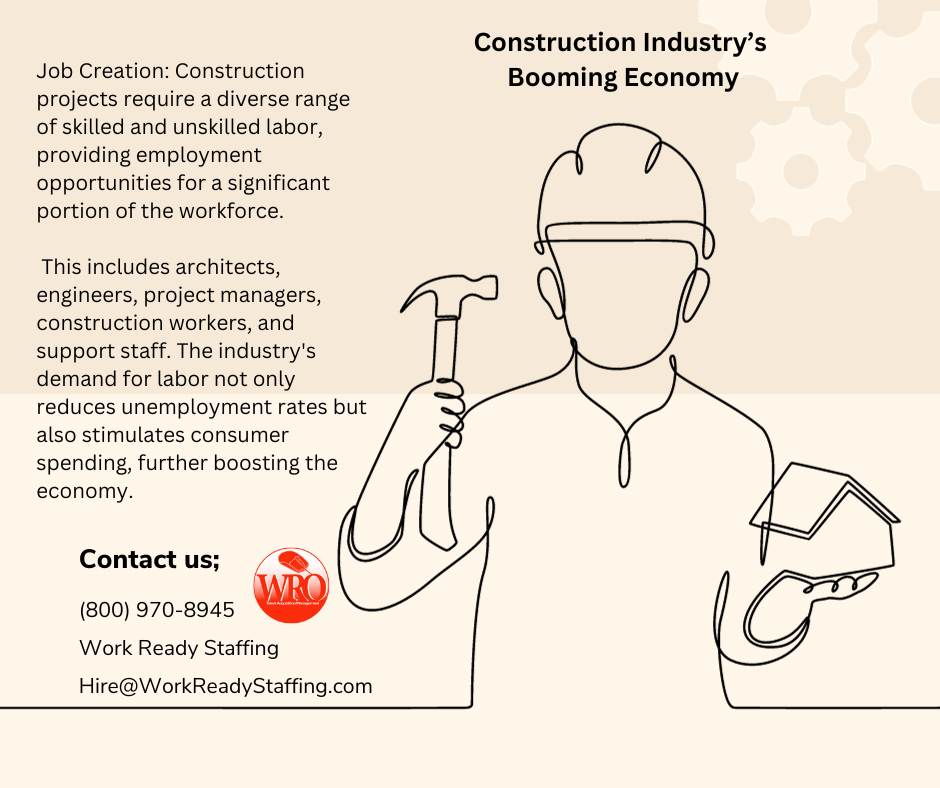The construction industry plays a pivotal role in contributing to a booming economy by fostering growth, creating jobs, and driving innovation. Here are several ways in which the construction sector positively impacts economic development:
Job Creation: Construction projects require a diverse range of skilled and unskilled labor, providing employment opportunities for a significant portion of the workforce. This includes architects, engineers, project managers, construction workers, and support staff. The industry’s demand for labor not only reduces unemployment rates but also stimulates consumer spending, further boosting the economy.
Multiplier Effect: The construction industry has a substantial multiplier effect, influencing other sectors of the economy. As construction projects progress, they generate demand for materials, equipment, and services from various suppliers and manufacturers. This interdependence creates a ripple effect throughout the economy, leading to increased production and consumption in related industries.
Infrastructure Development: The construction of infrastructure, such as roads, bridges, airports, and public buildings, enhances a country’s connectivity and functionality. Improved infrastructure not only facilitates the movement of goods and people but also attracts investment and encourages business growth. A well-developed infrastructure is a key driver of economic competitiveness.
Real Estate Market Stimulus: The construction of residential and commercial properties contributes to the vitality of the real estate market. As more buildings are erected, property values tend to rise, leading to increased wealth for property owners. Additionally, a thriving real estate market stimulates financial activities related to mortgages, insurance, and property transactions.
Innovation and Technology Adoption: The construction industry is continually evolving with advancements in technology and innovative construction methods. This evolution not only increases efficiency and productivity but also fosters innovation in related sectors. The adoption of new technologies in construction can spill over into other industries, driving economic growth through research and development.
Government Revenue: Construction activities generate substantial tax revenues for governments. Taxation on property transactions, construction materials, and the income generated by businesses in the construction sector contribute significantly to government coffers. These funds can be reinvested in public services, further supporting economic development.
Global Competitiveness: A well-developed construction industry enhances a country’s global competitiveness. Countries with robust infrastructure and a dynamic construction sector are more attractive to foreign investors and businesses looking to establish a presence. This, in turn, can lead to increased foreign direct investment and economic growth.
Economic Stability: The construction industry can act as a stabilizing force in times of economic downturns. Governments often invest in infrastructure projects during recessions to stimulate economic activity and create jobs, helping to mitigate the impact of economic challenges.
In summary, the construction industry’s multifaceted contributions, including job creation, infrastructure development, real estate market stimulation, innovation, and revenue generation, collectively play a vital role in fostering a booming economy. Its impact extends beyond the construction site, influencing various sectors and contributing to the overall well-being and prosperity of a nation.
Have a critical role to fill? Let’s connect. Our team of recruiting experts is ready to match you with top talent—fast, efficient, and tailored to your needs. Contact us today and let’s turn your vacancies into victories.






